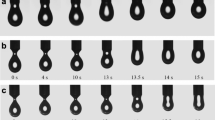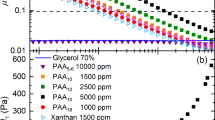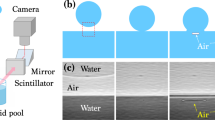Abstract
IN an investigation of circulation inside drops moving in a viscous medium, the drop size has been varied in order to determine the factors affecting the minimum size at which circulation can be detected. With some systems, such as water drops in castor oil, circulation commences at a Reynolds number in the range 0.03–0.1 (drop diameter 10–20 mm.), whereas with other systems such as chloroform or carbon tetrachloride in glycerol, circulation begins at much lower Reynolds number of 0.0003–0.001 (drop diameter 1–3 mm.). The interfacial tensions of the two systems are not widely different.
This is a preview of subscription content, access via your institution
Access options
Subscribe to this journal
Receive 51 print issues and online access
$199.00 per year
only $3.90 per issue
Buy this article
- Purchase on Springer Link
- Instant access to full article PDF
Prices may be subject to local taxes which are calculated during checkout
Similar content being viewed by others
References
Arnold, H. D., Phil. Mag., Ser. 6, 22, 755 (1911).
Savic, P., “Circulation and Distortion of Liquid Drops Falling through a Viscous Medium”, Report, National Research Council of Canada (July 1953).
Hadamard, M. J., C.R. Acad. Sci., Paris, 152, 1735 (1911).
Author information
Authors and Affiliations
Rights and permissions
About this article
Cite this article
GARNER, F., MATHUR, K. & JENSON, V. Distortion of Fluid Drops in the Stokesian Region. Nature 180, 331–332 (1957). https://doi.org/10.1038/180331a0
Issue Date:
DOI: https://doi.org/10.1038/180331a0
This article is cited by
Comments
By submitting a comment you agree to abide by our Terms and Community Guidelines. If you find something abusive or that does not comply with our terms or guidelines please flag it as inappropriate.



